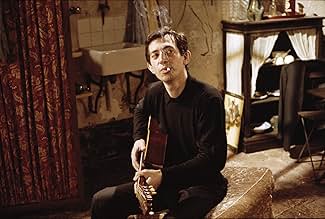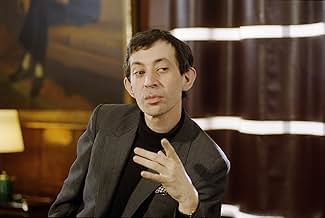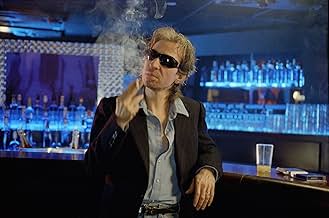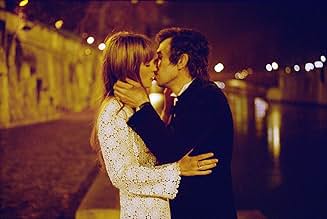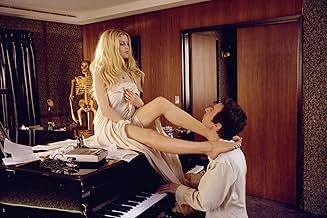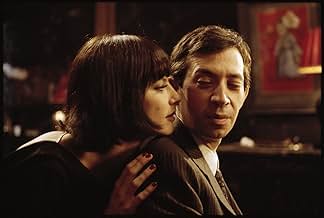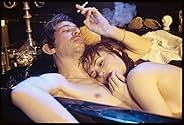Gainsbourg (Vie héroïque)
- 2010
- Tous publics
- 2h 15m
IMDb RATING
6.9/10
10K
YOUR RATING
A glimpse at the life of French singer Serge Gainsbourg, from growing up in 1940s Nazi-occupied Paris through his successful song-writing years in the 1960s to his death in 1991 at the age o... Read allA glimpse at the life of French singer Serge Gainsbourg, from growing up in 1940s Nazi-occupied Paris through his successful song-writing years in the 1960s to his death in 1991 at the age of 62.A glimpse at the life of French singer Serge Gainsbourg, from growing up in 1940s Nazi-occupied Paris through his successful song-writing years in the 1960s to his death in 1991 at the age of 62.
- Awards
- 7 wins & 11 nominations total
Dinara Drukarova
- Olga Ginsburg (la mère)
- (as Dinara Droukarova)
Featured reviews
This is a film that makes no bones about the ultimate squandering of Serge Gainsbourg's talents in a drink - induced decline but at the same time shows the creative and cultural force that his very surname still brings to mind for most French people . The movie brings out particularly well the smoky atmosphere of jazz clubs and gigs where the young Serge first plied his musicality in the 1950s. The phases of his life, from young Jewish boy in occupied France through his creative life and personal life ( for instance )amours with such as Brigitte Bardot and Jane Birkin in the 1960s are dizzily but effectively handled . There is some attempt by Director Sfar to portray Gainsbourg , in late career , as something of an anti- intolerance man of principle but the overall impression given is of an imaginative , somewhat amoral figure whose life was ultimately an example of artistic decline and hedonistic self-indulgence . The film is rather long but, overall , sustains interest well . The main roles are all played well by the actors ,including the female leads Laetitia Casta and the late Lucy Gordon , and the cartoon - like features of the movie , such as Serge's giant alter-ego , impressionistically contribute something positive to the story . Viewers from Anglophone countries who will best remember Gainsbourg as the singing half of the 1969 heavy- breathing pop hit " Je t'aime moi non plus " may still leave the cinema wondering what really was the artistic importance of Serge . Yet they will nonetheless , on the strength of this bio-pic , carry away an image of the principal character as an unforgettable personality .French people , on the other hand , who already regard him as a cultural icon and , in their terms ,as a genius will not need this movie to make up their minds about Serge Gainsbourg .
A film, concentrating on the personality of the composer-singer. An icon of twentieth century, not only for France, but to whole Europe, perhaps even to the whole Occidental world. Basically, this work of Joann Sfar is based onto the the most remarkable points of Gainsbourg's life, and that is, oh, so comprehensible, because otherwise we'd have a film of five hours or more, nevertheless the two hours and twenty minutes seem already sufficient. And maybe even more than that.
This interpretation of Serge Gainsbourgs' life is a work of flaming colors; of ambiances which change periodically with the passage of time, ups and downs of Serge's life. At the end, regarding on all the milieus seen, we realize not only the length of the film, but as well the rapid cultural changes in France of twentieth century.
Pursuing on that, Sfar starts leading the spectator on a guided tour called ''Serge's life''. It starts from the forties when France was bearing the heavy weight of German occupation – this is where Russian Jewish boy called Lucien Ginsburg grows up. Though, it is funny, that in this part of movie, we can find all the stereotypes of France, in particularly Paris, for which the rest of the world keeps going mad even nowadays. Let's see, here we have the artistic ambiances of Monmartre, very similar to those of Belle Époque, bohemian to the bone - the cozy cafés, femmes fatales, chanson française and so on... This movie couldn't be seen as a real biography, starting already with the small phantasms in a form of giant head of a Jewish man who comes out of a Nazi poster to play and dance with little Lucien. It is the same boy, who later imagines La Gueule, a caricatured idol of himself in the childhood, but a big, fat ego and an exteriorized inner voice, during the adult life.
Already as a kid, he is a real charmer, an artist with multiple talents, seducing everyone around him. With the time passing this capacity of seduction becomes more and more sexual. It grows in geometrical progression until we meet (very intimately) Brigitte Bardot, the sex symbol of the time. We possibly couldn't denie that Laetitia Casta not only resembles very much to the authentic goddess of the time. She does give some quite authentic elements of Bardot's performance in Vadim's Et Dieu Créa La Femme. When dating Brigitte Bardot, Lucien Ginsbourg is already long gone, it's now the eccentric, successful and famous Serge Gainsbourg. The self convinced type, always with a cigarette in the corner of his lips. Sfar realizes very well, that the "best-seller" of the Gainsbourg appearances is his profile view, which, no-one in nowadays' Europe would never mistake. Perhaps, it is also that the man who plays Gainsbourg. Eric Elmosnino, from this point of view does not look like himself, but like his portrayed character. Stunning resemblance! And we can find a short reference to Antonioni's Blow-Up. It is the iconic image of Jane Birkin, wearing nothing but bright colored stockings.
Being this far, it is not difficult to see that the main leading powers of Gainsbourg's fame were... his talent and the charming trouble makers' appearances. Sfar's film has depicted them both. More, the presence of the phantasms and loud spoken dialogs with his inner him – La Gueule, points at the will to make this movie a bit different from a simple telling of a biography (assuming, that a large number already knows it). But still, I'd like to say that it is not enough to make this film a real masterpiece. The linearity is a little bit boring, and after the first half of the movie has been seen, you might want to check your watch. This is an unstoppable rolling towards the end, the only limit of the man – the end. But cinema has such wonderful possibilities to play with reality and even time, so why could we not have a little bit more interesting way of telling this exciting story? This makes the movie a bit plain, even with such wonderful and detailed work on visual elements.
The music? I guess it is inutile to say what kind and whose music we hear in the film. The relations between the music and images are well done, they illustrate time and place and whispers how Serge is doing. Whether you like it or not, it is already another question...
This interpretation of Serge Gainsbourgs' life is a work of flaming colors; of ambiances which change periodically with the passage of time, ups and downs of Serge's life. At the end, regarding on all the milieus seen, we realize not only the length of the film, but as well the rapid cultural changes in France of twentieth century.
Pursuing on that, Sfar starts leading the spectator on a guided tour called ''Serge's life''. It starts from the forties when France was bearing the heavy weight of German occupation – this is where Russian Jewish boy called Lucien Ginsburg grows up. Though, it is funny, that in this part of movie, we can find all the stereotypes of France, in particularly Paris, for which the rest of the world keeps going mad even nowadays. Let's see, here we have the artistic ambiances of Monmartre, very similar to those of Belle Époque, bohemian to the bone - the cozy cafés, femmes fatales, chanson française and so on... This movie couldn't be seen as a real biography, starting already with the small phantasms in a form of giant head of a Jewish man who comes out of a Nazi poster to play and dance with little Lucien. It is the same boy, who later imagines La Gueule, a caricatured idol of himself in the childhood, but a big, fat ego and an exteriorized inner voice, during the adult life.
Already as a kid, he is a real charmer, an artist with multiple talents, seducing everyone around him. With the time passing this capacity of seduction becomes more and more sexual. It grows in geometrical progression until we meet (very intimately) Brigitte Bardot, the sex symbol of the time. We possibly couldn't denie that Laetitia Casta not only resembles very much to the authentic goddess of the time. She does give some quite authentic elements of Bardot's performance in Vadim's Et Dieu Créa La Femme. When dating Brigitte Bardot, Lucien Ginsbourg is already long gone, it's now the eccentric, successful and famous Serge Gainsbourg. The self convinced type, always with a cigarette in the corner of his lips. Sfar realizes very well, that the "best-seller" of the Gainsbourg appearances is his profile view, which, no-one in nowadays' Europe would never mistake. Perhaps, it is also that the man who plays Gainsbourg. Eric Elmosnino, from this point of view does not look like himself, but like his portrayed character. Stunning resemblance! And we can find a short reference to Antonioni's Blow-Up. It is the iconic image of Jane Birkin, wearing nothing but bright colored stockings.
Being this far, it is not difficult to see that the main leading powers of Gainsbourg's fame were... his talent and the charming trouble makers' appearances. Sfar's film has depicted them both. More, the presence of the phantasms and loud spoken dialogs with his inner him – La Gueule, points at the will to make this movie a bit different from a simple telling of a biography (assuming, that a large number already knows it). But still, I'd like to say that it is not enough to make this film a real masterpiece. The linearity is a little bit boring, and after the first half of the movie has been seen, you might want to check your watch. This is an unstoppable rolling towards the end, the only limit of the man – the end. But cinema has such wonderful possibilities to play with reality and even time, so why could we not have a little bit more interesting way of telling this exciting story? This makes the movie a bit plain, even with such wonderful and detailed work on visual elements.
The music? I guess it is inutile to say what kind and whose music we hear in the film. The relations between the music and images are well done, they illustrate time and place and whispers how Serge is doing. Whether you like it or not, it is already another question...
Serge Gainsbourg was many things: an artist, writer, painter, alcoholic and lover to many. He is a fascinating man who lead a fascinating life and director Joann Sfar makes a great effort here to portray it all. From the early days prior to WWII Gainsbourg was clearly going to amount to something. As he grew older and dabbled here and there in various art forms and dabbled in various women with lovers including Bridgette Bardot and Jane Birkin. Yet as he grew older Gainsbourg dabbled in more drink and drugs and this led to a troubled life.
I was to begin with fascinated by this man, full of charm and wit and ideas abounding. Yet as the film progressed I felt less and less concerned by this man and began wondering when the film might end. As interesting he was, he was also not the nicest of characters, especially in his latter years when he appears to be a drunk and grumpy man. The little touches of fantasy work well to begin with, Gainsbourg's 'imaginary friend' is interesting, but then becomes more and more grotesque and yet more annoying and often blurs the line between realism and surrealism.
Ultimately this has enough to provide an interesting account of someone who had a very full life, but for me it lost it's way part way through and therefore lost it's momentum.
More of my reviews at iheartfilms.weebly.com
I was to begin with fascinated by this man, full of charm and wit and ideas abounding. Yet as the film progressed I felt less and less concerned by this man and began wondering when the film might end. As interesting he was, he was also not the nicest of characters, especially in his latter years when he appears to be a drunk and grumpy man. The little touches of fantasy work well to begin with, Gainsbourg's 'imaginary friend' is interesting, but then becomes more and more grotesque and yet more annoying and often blurs the line between realism and surrealism.
Ultimately this has enough to provide an interesting account of someone who had a very full life, but for me it lost it's way part way through and therefore lost it's momentum.
More of my reviews at iheartfilms.weebly.com
Where does this amazing film come from? Who is Joann Sfar, a director I never heard about before? The easiest answer at hand was the wikipedia entry which tells us that Sfar is a well known comics author in the fabulous French-Belgian tradition. He is of Jewish origin, and his next film is an adaptation of one of his comics successes called The Rabbi's Cat.
And suddenly all makes sense. The opening scenes of the film contain the key of the biography of French musician and poet Serge Gainsbourg as imagined by Sfar. We see Lucien Ginzburg, a Jewish kid in occupied Paris during WWII daring not only to laugh in fronde at the nose of the collaborationist police by being the first in line to receive his yellow Star of David as a sign of nobility rather than an anathema, but moreover, to transform in his mind and his sketch drawings the fat rapacious Jew on the Vichy posters in the thin, stylish, long nose and big years Gueule - the alter-ego who will guide his steps and feed his revenging self-confidence for the rest of his life.
The combination of acting and cartoon is not a new thing, but it has never been tried before in a biopic to the best of my knowledge. Sure, it is not the usual respectful biopic but it's the vision of Sfar about Ginzburg - Gainsbourg, and Sfar he says in the final text before the credits was more interested about Gainsbourg lies than by his perceived truths. Moreover, for sure Gainsbourg himself would not have appreciated a respectful film. Ironically under-titled 'Vie heroique' (heroic life) the film takes us though the artistic and especially womanizing career of Gainsbourg from the early 50s to the late 70s. We see him in the company of such French cultural icon as Boris Vian and especially of fabulous women such as Juliette Greco, Brigitte Bardot and Jane Birkin (and actually the list in the film is very partial). I enjoyed each of the scenes in this part of the film which combine style, attention to details (just follow how fashion changes marking the progress of time) and deep understanding of the atmosphere of the Parisian clubs and artistic milieu in the mythic mid-20 century. His Gueule alter-ego mentors him though this trip and when he decides to renounce his patronizing, it's the beginning of the end - the charisma goes away and the effects of his excesses slowly destroy him. Maybe a little more of his art would have provided an even more complex and balanced image of the person that Gainsbourg was - this would be my only observation.
The choice of Eric Elmosnino as Gainsbourg is excellent, he drives the character from the insecurity of the young age to the decay of the end, all the time with charm and deep empathy. He proves a perfect understanding of the intentions of the director and a full identification with the identity dilemmas of the French-Jewish Gainsbourg. Laetitia Casta is a perfect replica of Bardot. Lucy Gordon is mastering very well Jane Birkin's role. Her maturity makes even harder to explain the suicide of the young actress a few days before the film was presented in avant-premiere at Cannes.
And suddenly all makes sense. The opening scenes of the film contain the key of the biography of French musician and poet Serge Gainsbourg as imagined by Sfar. We see Lucien Ginzburg, a Jewish kid in occupied Paris during WWII daring not only to laugh in fronde at the nose of the collaborationist police by being the first in line to receive his yellow Star of David as a sign of nobility rather than an anathema, but moreover, to transform in his mind and his sketch drawings the fat rapacious Jew on the Vichy posters in the thin, stylish, long nose and big years Gueule - the alter-ego who will guide his steps and feed his revenging self-confidence for the rest of his life.
The combination of acting and cartoon is not a new thing, but it has never been tried before in a biopic to the best of my knowledge. Sure, it is not the usual respectful biopic but it's the vision of Sfar about Ginzburg - Gainsbourg, and Sfar he says in the final text before the credits was more interested about Gainsbourg lies than by his perceived truths. Moreover, for sure Gainsbourg himself would not have appreciated a respectful film. Ironically under-titled 'Vie heroique' (heroic life) the film takes us though the artistic and especially womanizing career of Gainsbourg from the early 50s to the late 70s. We see him in the company of such French cultural icon as Boris Vian and especially of fabulous women such as Juliette Greco, Brigitte Bardot and Jane Birkin (and actually the list in the film is very partial). I enjoyed each of the scenes in this part of the film which combine style, attention to details (just follow how fashion changes marking the progress of time) and deep understanding of the atmosphere of the Parisian clubs and artistic milieu in the mythic mid-20 century. His Gueule alter-ego mentors him though this trip and when he decides to renounce his patronizing, it's the beginning of the end - the charisma goes away and the effects of his excesses slowly destroy him. Maybe a little more of his art would have provided an even more complex and balanced image of the person that Gainsbourg was - this would be my only observation.
The choice of Eric Elmosnino as Gainsbourg is excellent, he drives the character from the insecurity of the young age to the decay of the end, all the time with charm and deep empathy. He proves a perfect understanding of the intentions of the director and a full identification with the identity dilemmas of the French-Jewish Gainsbourg. Laetitia Casta is a perfect replica of Bardot. Lucy Gordon is mastering very well Jane Birkin's role. Her maturity makes even harder to explain the suicide of the young actress a few days before the film was presented in avant-premiere at Cannes.
Lucien 'Serge Gainsbourg' Ginsburg. Artist. Writer. Performer. Alcoholic. Smoker. Rebel. Womanizer. Genius? Joann Sfar's film documents the sporadic lifestyle of the famous French artist Serge Gainsbourg (Eric Elmosnino), whose life contained no boundaries, no objects off limit, and continually tested the patience of those huddled together around him. Beginning with a young Gainsbourg developing his taste for painting aspiring models in Nazi-Occupied France as a mere teenager, the film thereupon concentrates primarily upon his relationships with various beautiful women and his life choices in regards to his ever-changing occupation over his sixty-year-life-span.
What makes this film work so well as a biopic is the truly ingenious performances by both Kacey Mottet Klein (Young Gainsbourg) and Eric Elmosnino (Adult Gainsbourg) who both somewhat beautifully represent such a tragic figure throughout his whole on-screen lifetime. Kacey portrays Gainsbourg as a boy who is maturing faster than those other children around him, so far so, that he explains to one of the schoolchildren the reason that he is good at drawing pubic hairs is because he has had an up-close and personal experience with them before. While he is also shown to be a lonely child, an outcast as Jewish child growing up in Nazi-Occupied France, and thus he develops an affable 'imaginary friend' to keep himself company. Born as small, soft head that watches over young Gainsbourg as he sleeps in the woods to avoid the Nazi soldiers, his only friend soon becomes his worst enemy as he matures into a complicated man. His once pleasant 'imaginary friend' is now a grotesque being with a large nose, long-thin fingers and an affection for cigarettes and bullying Gainsbourg. He continually berates insults, prods and engages Serge, providing the viewpoint that he himself was his harshest critic, and a critic he could not simply dismiss without entire control over his life.
Aside from the performances, the way Sfar allows the films narrative to flow in a temporal manner with no mention of time, or calendar dates, further draws the audience in to Gainsbourg's contrived world. The only way to tell when an event shifts forward in his lifetime, is through his own physical deterioration from old age which is heavily dictated by his excessive abuse of alcohol and tobacco. But as Gainsbourg becomes older, his sexual conquests stay the same age; from Elisabeth (Deborah Grall), to Jane (the late Lucy Gordon), and to an affair with the insatiable Brigitte Bardot (Laetitia Casta), before he eventually settles down with Bambou (Mylene Jampanoi), who would be his final partner. These are all young, vulnerable women who Gainsbourg exploits for his own sexual misgivings, and once they become too old, or too boring, he discards them like a child throwing away an old toy to badger his parents for a new, more expensive model.
Joann Sfar beautifully flowing biopic paints Serge Gainsbourg as a shallow, misogynistic, grumpy old man, who once had dreams of becoming famous for doing anything, but once those dreams were realised, greed and narcissism triumphed over his once forgotten ambitions. Utilizing his gift for writing, artistry and music Gainsbourg chose the route of controversy and scandal over that of happiness and family, which is exemplified in his response to the media after he had a heart attack. When the reporters asked what he will be doing now after such a dangerous and life threatening operation, Gainsbourg calmly asserted to those in attendance that he will "continue to smoke many more cigarettes and drink much more alcohol."
What makes this film work so well as a biopic is the truly ingenious performances by both Kacey Mottet Klein (Young Gainsbourg) and Eric Elmosnino (Adult Gainsbourg) who both somewhat beautifully represent such a tragic figure throughout his whole on-screen lifetime. Kacey portrays Gainsbourg as a boy who is maturing faster than those other children around him, so far so, that he explains to one of the schoolchildren the reason that he is good at drawing pubic hairs is because he has had an up-close and personal experience with them before. While he is also shown to be a lonely child, an outcast as Jewish child growing up in Nazi-Occupied France, and thus he develops an affable 'imaginary friend' to keep himself company. Born as small, soft head that watches over young Gainsbourg as he sleeps in the woods to avoid the Nazi soldiers, his only friend soon becomes his worst enemy as he matures into a complicated man. His once pleasant 'imaginary friend' is now a grotesque being with a large nose, long-thin fingers and an affection for cigarettes and bullying Gainsbourg. He continually berates insults, prods and engages Serge, providing the viewpoint that he himself was his harshest critic, and a critic he could not simply dismiss without entire control over his life.
Aside from the performances, the way Sfar allows the films narrative to flow in a temporal manner with no mention of time, or calendar dates, further draws the audience in to Gainsbourg's contrived world. The only way to tell when an event shifts forward in his lifetime, is through his own physical deterioration from old age which is heavily dictated by his excessive abuse of alcohol and tobacco. But as Gainsbourg becomes older, his sexual conquests stay the same age; from Elisabeth (Deborah Grall), to Jane (the late Lucy Gordon), and to an affair with the insatiable Brigitte Bardot (Laetitia Casta), before he eventually settles down with Bambou (Mylene Jampanoi), who would be his final partner. These are all young, vulnerable women who Gainsbourg exploits for his own sexual misgivings, and once they become too old, or too boring, he discards them like a child throwing away an old toy to badger his parents for a new, more expensive model.
Joann Sfar beautifully flowing biopic paints Serge Gainsbourg as a shallow, misogynistic, grumpy old man, who once had dreams of becoming famous for doing anything, but once those dreams were realised, greed and narcissism triumphed over his once forgotten ambitions. Utilizing his gift for writing, artistry and music Gainsbourg chose the route of controversy and scandal over that of happiness and family, which is exemplified in his response to the media after he had a heart attack. When the reporters asked what he will be doing now after such a dangerous and life threatening operation, Gainsbourg calmly asserted to those in attendance that he will "continue to smoke many more cigarettes and drink much more alcohol."
Did you know
- TriviaThe project was originally envisioned with Serge Gainsbourg's real life daughter, actress Charlotte Gainsbourg to play him in keeping with the film's surreal and fairytale-esque tone. Six months into rehearsals and preparation Gainsbourg pulled out telling director Joann Sfar, it was proving too emotionally painful and he would have to make his "beautiful film" without her. Sfar had always approached the film with her in mind and was ready to abort the project when fate lead him to Eric Elmosnino.
- GoofsThe young Gainsbourg is shown drawing left-handed, but the adult Gainsbourg becomes right-handed.
- Quotes
Serge Gainsbourg: [after a man tips him while he plays the piano] What are you fucking kidding me? I'm not a jukebox!
- Crazy credits"Pour Lucy" i.e. this was Lucy Gordon 's last film.
- Alternate versionsEngland is the first territory to release a new cut of the film, running 14 minutes shorter than the previous version and is Joann Sfar's preferred one. Changes include -
- Deletion of the scene where young Serge pleads in vain for his mother to buy him a gun to play with, even attempting to bribe her by saying he'll work harder on the piano. This precedes the scene where he steals the gun from the shop.
- Deletion of the scene where Serge and Boris Vian walk to his apartment and the two lie in the road in an effort to stop a cab. While they wait Serge reveals he has a double that follows him around to which Vian replies his is a werewolf. However two policemen soon cut the conversation short. (This precedes Serge arriving at Boris's apartment and explains a later scene where a drunken Serge lies in the road before having the police escort to his concert)
- Longer scene of the "Baby Pop" groupies, as Gainsbourg wakes up in bed with two naked women as his Mug joyously tosses bank statements at him revealing how rich he is from "Poupée de cire, poupée de son" alone! This is the original lead in to "Qui Est In Qui Est Out".
- The groupies and party to "Qui Est In Qui Est Out" is cut short, removing Serge narrating about "the mouth being the primary sexual organ". His narration reveals the girls in the room he has slept with and how he was with them. It reveals Gainsbourg's occasional cruel streak and precedes the angry neighbor banging on the door.
- After Gainsbourg recites La Marseillaise at the press conference, we then see young Serge repeating it and triumphantly raising his fist to the audience.
- Deletion of a short exchange in the nightclub when a reveller comments to Gainsbourg about him being parodied on a French TV show. The new version removes these lines either because the show is unknown outside of France or because it doesn't tie in as being the night Gainsbourg met his wife Bambou as that TV show wouldn't air until years later. Sfar has said this new version will be the one further released worldwide.
- ConnectionsFeatured in De wereld draait door: Episode #5.128 (2010)
Details
- Release date
- Country of origin
- Official sites
- Languages
- Also known as
- Gainsbourg: A Heroic Life
- Filming locations
- Rue de Verneuil, Paris 6, Paris, France(Gainsbourg's house)
- Production companies
- See more company credits at IMDbPro
Box office
- Budget
- €11,500,000 (estimated)
- Gross US & Canada
- $233,007
- Opening weekend US & Canada
- $25,189
- Sep 4, 2011
- Gross worldwide
- $12,220,456
- Runtime2 hours 15 minutes
- Color
- Sound mix
- Aspect ratio
- 2.35 : 1
Contribute to this page
Suggest an edit or add missing content

Top Gap
By what name was Gainsbourg (Vie héroïque) (2010) officially released in Canada in English?
Answer



